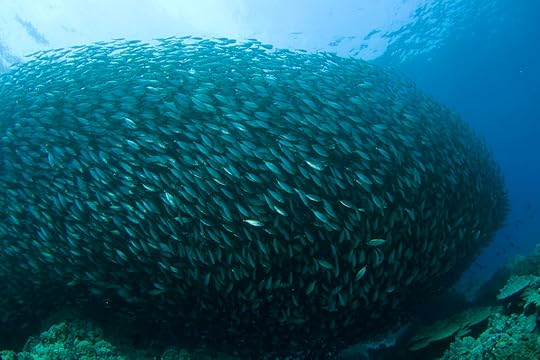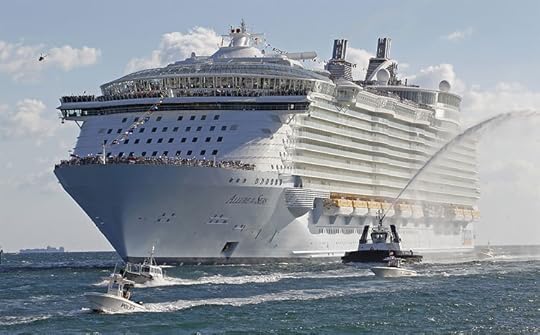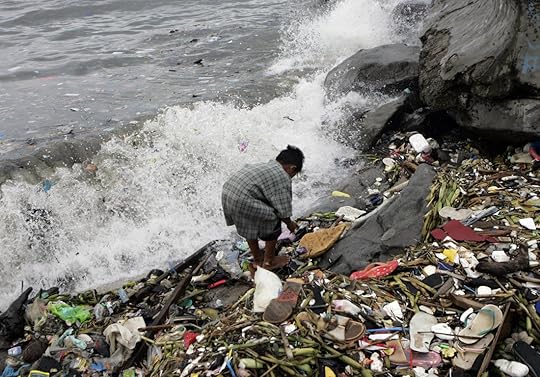M.I. Lastman's Blog, page 20
February 8, 2015
Aforementioned: aphorisms and questions for 2015
The three overarching threats: global warming, plague of homo sapiens, testosterone tempest. Fix all or none. 





Published on February 08, 2015 05:26
February 7, 2015
Aforementioned: aphorisms and questions for 2015
Nature loves a crowd. 

 These pictures all make the point that Nature teaches us to accommodate one another in a crowd. The middle picture of a Mexico city crowd doing the wave demonstrates simply that we are no different from ants, fish and countless other species when we come together in huge numbers. Clearly Nature normally absorbs crowds, but sometimes they become overwhelming. We call this plague. Consider the space occupied by the schooling humans in the middle picture with the physical space occupied by the creatures in the other two pictures.
These pictures all make the point that Nature teaches us to accommodate one another in a crowd. The middle picture of a Mexico city crowd doing the wave demonstrates simply that we are no different from ants, fish and countless other species when we come together in huge numbers. Clearly Nature normally absorbs crowds, but sometimes they become overwhelming. We call this plague. Consider the space occupied by the schooling humans in the middle picture with the physical space occupied by the creatures in the other two pictures.


 These pictures all make the point that Nature teaches us to accommodate one another in a crowd. The middle picture of a Mexico city crowd doing the wave demonstrates simply that we are no different from ants, fish and countless other species when we come together in huge numbers. Clearly Nature normally absorbs crowds, but sometimes they become overwhelming. We call this plague. Consider the space occupied by the schooling humans in the middle picture with the physical space occupied by the creatures in the other two pictures.
These pictures all make the point that Nature teaches us to accommodate one another in a crowd. The middle picture of a Mexico city crowd doing the wave demonstrates simply that we are no different from ants, fish and countless other species when we come together in huge numbers. Clearly Nature normally absorbs crowds, but sometimes they become overwhelming. We call this plague. Consider the space occupied by the schooling humans in the middle picture with the physical space occupied by the creatures in the other two pictures.
Published on February 07, 2015 05:58
February 6, 2015
Aforementioned: Aphorisms and questions for 2015
Our virtual happiness through technology belies the lateness of the hour

 We undertake bigger and more daring and energy expensive feats of technology with each passing year. In the background looms the melting of the artic sea ice (the third lowest extent on record this past January http://nsidc.org/arcticseaicenews/) and the rapidly approaching catastrophe of the release of vast quantities of methane into the atmosphere. This will mean at the very least the utter collapse of civilization - no more gigantic cruise ships, although their skeletons will like survive for eons. We are talking very soon now, folks.
We undertake bigger and more daring and energy expensive feats of technology with each passing year. In the background looms the melting of the artic sea ice (the third lowest extent on record this past January http://nsidc.org/arcticseaicenews/) and the rapidly approaching catastrophe of the release of vast quantities of methane into the atmosphere. This will mean at the very least the utter collapse of civilization - no more gigantic cruise ships, although their skeletons will like survive for eons. We are talking very soon now, folks.

 We undertake bigger and more daring and energy expensive feats of technology with each passing year. In the background looms the melting of the artic sea ice (the third lowest extent on record this past January http://nsidc.org/arcticseaicenews/) and the rapidly approaching catastrophe of the release of vast quantities of methane into the atmosphere. This will mean at the very least the utter collapse of civilization - no more gigantic cruise ships, although their skeletons will like survive for eons. We are talking very soon now, folks.
We undertake bigger and more daring and energy expensive feats of technology with each passing year. In the background looms the melting of the artic sea ice (the third lowest extent on record this past January http://nsidc.org/arcticseaicenews/) and the rapidly approaching catastrophe of the release of vast quantities of methane into the atmosphere. This will mean at the very least the utter collapse of civilization - no more gigantic cruise ships, although their skeletons will like survive for eons. We are talking very soon now, folks.
Published on February 06, 2015 13:58
February 5, 2015
Aforementioned: aphorisms and questions for 2015
Homo sapiens sapiens-wisely sapient . . . are we the last chance to save ourselves from homo sapiens? Let us pray for wisdom.



 What are all these nice people praying for: one another, peace, the salvation of the biosphere, wisdom? Do you suppose they might be hoping to be favoured by their gods?
What are all these nice people praying for: one another, peace, the salvation of the biosphere, wisdom? Do you suppose they might be hoping to be favoured by their gods?



 What are all these nice people praying for: one another, peace, the salvation of the biosphere, wisdom? Do you suppose they might be hoping to be favoured by their gods?
What are all these nice people praying for: one another, peace, the salvation of the biosphere, wisdom? Do you suppose they might be hoping to be favoured by their gods?
Published on February 05, 2015 12:14
February 4, 2015
Aforementioned: aphorisms and questions for 2015
There should be plenty of fresh water available for 12 billion humans and the rest of the living biosphere. It is about one percent of the total of water on earth. However, we are, with 7 and a quarter billion people reaching the limits of available fresh water. Almost all available fresh water is polluted or contaminated in some way and we either don't want to or cannot live close to abundant supplies. 70% of fresh water is tied up in ice which we humans in our wisdom are doing our best to melt into the seas. See the Greenland ice sheet and the huge lakes of the Canadian Shield in this first picture. 
 There's no planet B
There's no planet B  This is an arial view of the mouth of the Amazon river. Only about five percent of this fresh water source is available for human use. For a good overview of planetary freshwater resources see: http://goo.gl/1nPJx it was published in 2006. Suffice it to say that nine years later the situation is much worse.
This is an arial view of the mouth of the Amazon river. Only about five percent of this fresh water source is available for human use. For a good overview of planetary freshwater resources see: http://goo.gl/1nPJx it was published in 2006. Suffice it to say that nine years later the situation is much worse.

 There's no planet B
There's no planet B  This is an arial view of the mouth of the Amazon river. Only about five percent of this fresh water source is available for human use. For a good overview of planetary freshwater resources see: http://goo.gl/1nPJx it was published in 2006. Suffice it to say that nine years later the situation is much worse.
This is an arial view of the mouth of the Amazon river. Only about five percent of this fresh water source is available for human use. For a good overview of planetary freshwater resources see: http://goo.gl/1nPJx it was published in 2006. Suffice it to say that nine years later the situation is much worse.
Published on February 04, 2015 09:35
February 3, 2015
Aforementioned: aphorisms and questions for 2015
If billions of us can coalesce around a vital World Cup (2014), maybe we can come together around something trivial like saving the biosphere.
Here is your chance, Michael Bloomberg, advertise on the score boards and pay for ticker tapes on the bottom of television screens for mega sporting events around the world.
Everyone, not just the educated wealthy, need to understand the gravity of the situation.
Michael Bloomberg, former mayor of New York City, media magnate, and philanthropist is a business leader who has spoken out consistently about the dangers of global warming. He has the resources and the knowhow to organize a major advertising campaign tied to sporting events.
Here is your chance, Michael Bloomberg, advertise on the score boards and pay for ticker tapes on the bottom of television screens for mega sporting events around the world.
Everyone, not just the educated wealthy, need to understand the gravity of the situation.
Michael Bloomberg, former mayor of New York City, media magnate, and philanthropist is a business leader who has spoken out consistently about the dangers of global warming. He has the resources and the knowhow to organize a major advertising campaign tied to sporting events.
Published on February 03, 2015 06:16
February 1, 2015
Aforementioned: aphorisms and questions for 2015
Nature, the mother of expediency  The Queensland floods are over
The Queensland floods are over  The mighty bison herds are almost over having narrowly missed extermination.
The mighty bison herds are almost over having narrowly missed extermination.  We are in full flood. What a pile of skulls that crowd would make. There's no planet B
We are in full flood. What a pile of skulls that crowd would make. There's no planet B
 The Queensland floods are over
The Queensland floods are over  The mighty bison herds are almost over having narrowly missed extermination.
The mighty bison herds are almost over having narrowly missed extermination.  We are in full flood. What a pile of skulls that crowd would make. There's no planet B
We are in full flood. What a pile of skulls that crowd would make. There's no planet B
Published on February 01, 2015 12:45
Aforementioned: aphorisms and questions for 2015
In one crowded sea, we are 7 billion islands each with its own bowl of chips, chicken wings, and cheap beer.
 Follow me my people
Follow me my people
If this post seems a little enigmatic, it's just that the urge to chips, chicken wings, and cheap beer on chomp down bowl Chowday is a metaphor for the urge to follow that aflicts all we sheepish islands. In passing I note that following seems to thrive on a healthy seasoning of testosterone.
 Follow me my people
Follow me my peopleIf this post seems a little enigmatic, it's just that the urge to chips, chicken wings, and cheap beer on chomp down bowl Chowday is a metaphor for the urge to follow that aflicts all we sheepish islands. In passing I note that following seems to thrive on a healthy seasoning of testosterone.
Published on February 01, 2015 07:31
January 31, 2015
Aforementioned: aphorisms and questions for 2015
Formal education facilitates ethics drift. It enables science, law, religion, mechanized warfare, bulldozers – all enemies of nature.
This tweet engages a complex argument and since no one, it seems, is prepared to see education, however the term is used, as anything other than the embodiment of good possibilities, I could not find an argument anywhere on the web to either support or debate what I am proposing in this tweet.
By formal education I mean any type of education that arises from human cultural evolution, and that, of course, includes the educational possibilities of the web. The means of education will change (evolve culturally) but its meaning will not.
I have no wish to deny its material benefits, to name a few: widespread longevity, wise philosophy, the understanding that natural science affords us. However, hold your breath, and reflect for a moment on the tweet. We need to read and write to have any access to science or law and we need those skills to perpetrate religion, mechanized warfare, or bulldozed forests.
This is a crux. Perhaps we need to rethink education. The fact that it’s a catch 22 doesn’t mean that we have any choice other than to solve it. I would say that the way forward probably lies with the acceptance of the premises of Cicero’s syllogism:
Whatever is just is also expedient; and, in like manner, whatever is morally right is also just. It follows, then, that whatever is morally right is also expedient.
This tweet engages a complex argument and since no one, it seems, is prepared to see education, however the term is used, as anything other than the embodiment of good possibilities, I could not find an argument anywhere on the web to either support or debate what I am proposing in this tweet.
By formal education I mean any type of education that arises from human cultural evolution, and that, of course, includes the educational possibilities of the web. The means of education will change (evolve culturally) but its meaning will not.
I have no wish to deny its material benefits, to name a few: widespread longevity, wise philosophy, the understanding that natural science affords us. However, hold your breath, and reflect for a moment on the tweet. We need to read and write to have any access to science or law and we need those skills to perpetrate religion, mechanized warfare, or bulldozed forests.
This is a crux. Perhaps we need to rethink education. The fact that it’s a catch 22 doesn’t mean that we have any choice other than to solve it. I would say that the way forward probably lies with the acceptance of the premises of Cicero’s syllogism:
Whatever is just is also expedient; and, in like manner, whatever is morally right is also just. It follows, then, that whatever is morally right is also expedient.
Published on January 31, 2015 07:54
January 30, 2015
Aforementioned: aphorisms and questions for 2015
Laws cannot truthfully confront #ethicsdrift. Some lawyers are the indispensible spin doctors of ethics drift.
Excerpts from Marcus Tullius Cicero. De Officiis, translated by Walter Miller, Loeb Edition (Cambridge: Harvard University Press, 1913), courtesy of http://www.stoics.com
BOOK III. xii.
XII. Let it be set down as an established principle, then, that what is morally wrong can never be expedient - not even when one secures by means of it that which one thinks expedient; for the mere act of thinking a course expedient, when it is morally wrong, is demoralizing.
The whole argument is very worth a twenty minute read:
http://www.google.ca/url?sa=t&rct=j&q=&esrc=s&source=web&cd=5&ved=0CDMQFjAE&url=http%3A%2F%2Fwww2.onu.edu%2F~s-veltri%2Fproperty%2FCicero.rtf&ei=iJrLVJSvDceyggS-oYKYDQ&usg=AFQjCNGWNzTDwuRioYUz12SKqOrlf0IOqg&bvm=bv.84607526,d.eXY
Here is the quote in a more up-to-date rendering:
What is morally wrong can never be advantageous, even when it enables you to make some gain that you believe to be to your advantage. The mere act of believing that some wrongful course of action constitutes an advantage is pernicious.”
Let it be said that even Cicero was never entirely comfortble with the problem of ethics drift. What about the situation when a lawyer is necessarily called upon to defend wrong or evil? How about this argument taken from book two of De Officiis:
. . . they do this, I assume, on moral, conscientious principles. (For whatever is just, they hold, is also expedient; and, in like manner, whatever is morally right is also just. It follows, then, that whatever is morally right is also expedient.) Those who fail to comprehend that theory do often, in their admiration for shrewd and clever men, take craftiness for wisdom. But they must be disabused of this error and their way of thinking must be wholly converted to the hope and conviction that it is only by moral character and righteousness, not by dishonesty and craftiness, that they may attain to the objects of their desires.
It is the bracketed syllogism that is important here. Did Cicero really accept the premises on which it is built? Who among us today do or can? Somewhere in the background the necessary lie must lurk. Still, De Officiis is an invaluable if somewhat daunting read.
http://www.constitution.org/rom/de_officiis.htm
Published on January 30, 2015 07:41



